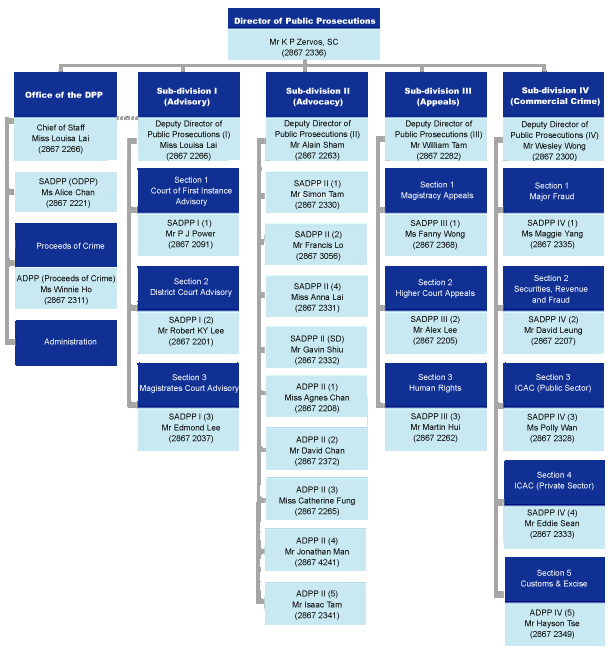

Organisation chart of the Prosecutions Division
5th - 7th floors, High Block, QGO
Enquiries : 2867 2258
Fax : 2877 0171

The role of the Prosecutions Division is to prosecute trials and appeals on behalf of the HKSAR, to provide legal advice to law enforcement agencies upon their investigations, and generally to exercise on behalf of the Secretary for Justice the discretion whether or not to bring criminal proceedings in the HKSAR. In addition, counsel in the division provide advice and assistance to government bureaus and departments in relation to any criminal law aspects of proposed legislation.
The prosecution of offences
A criminal case may be prosecuted in the Magistrates’ Courts (for relatively minor offences) or in the District Court or the Court of First Instance where the offence is more serious. The decision whether or not to prosecute, and on what charges, is taken by the Secretary for Justice or by counsel acting on behalf of the Secretary in the Prosecutions Division. The Secretary is ultimately responsible for all prosecution decisions. In the decision-making process, the prosecution policy guidelines (which were first published in 1993 and updated in 1998, 2002 and 2008) are applied.
The majority of prosecutions in the Magistrates’ Courts are conducted by public prosecutors, called Court Prosecutors. They are appointed by the Secretary for Justice under section 13 of the Magistrates Ordinance (Cap 227) and have rights of audience in the Magistrates’ Courts. Every Court Prosecutor attends an initial nine-month training course run by counsel in the Department of Justice before starting work. Throughout their careers thereafter as Court Prosecutors, they will participate in a programme of continuing legal education.
Counsel in the Prosecutions Division will sometimes prosecute in the Magistrates’ Courts, particularly in cases of significance or where complex points of law are expected to arise. Counsel in the division handle almost all appeals, the majority of prosecutions in the Court of First Instance, and a considerable number of cases in the District Court. Counsel from the private bar and solicitors in private practice are regularly employed to prosecute on behalf of the division (referred to as a counsel or solicitor “on fiat”).
Before a case goes to trial, there is considerable work to be done by counsel in the division in marshalling and evaluating the evidence and carrying out any necessary legal research. While some counsel in the division specialise in presenting cases at trial, or on appeal, other counsel appear in court less often and instead specialise in the vital work of preparing cases for trial in either the District Court or the Court of First Instance.Sir Ken Macdonald’s report
In January 2010, with a view to modernising the Prosecutions Division and to further improving its efficiency as a world class prosecution service, the division commissioned Sir Ken Macdonald, QC (now Lord Macdonald), the former Director of Public Prosecutions of England and Wales, to review the operations of the division. Having interviewed a wide range of individuals, in February 2010 Sir Ken submitted a review report recommending a line of changes in relation to the Prosecutions Division’s organisational structure, internal practices and procedures, the division and distribution of work, the nature and provision of training and the functions and duties of legal and paralegal staff and the division’s relationships and dealings with outside agencies. Pursuant to the recommendations made by Sir Ken, a number of reforms and new initiatives have been put in place.
The restructuring of the Prosecutions Division
A key element of this restructuring exercise was the creation of a new Office of the Director of Public Prosecutions (ODPP). The ODPP is headed by the Chief of Staff and is responsible for all management and policy development of the division. The areas of responsibility covered by the ODPP are wide, namely media relations, administration and management, policy research and training and complaints and feedback. The operational work of the division is conducted by the other four sub-divisions: (a) Sub-division I Advisory, which is responsible for providing advice on and preparing for trial cases which are prosecuted in the Court of First Instance, District Court and Magistrates Court; (b) Sub-division II Advocacy, responsible for conducting advocacy work at all levels; (c) Sub-division III Appeals, responsible for advising and conducting appellate advocacy work including Basic Law, Bills of Rights and Judicial Review; and (d) Sub-division IV Commercial Crime, responsible for dealing with cases involving commercial fraud, bribery, dutiable commodities, technology crimes, securities and revenue fraud and breach of copyright and trade descriptions.
Proceeds of crime
As part of the restructuring of the division, the Proceeds of Crime Section has been brought directly under the control of the head of Sub-division I because of the wide application and relevance of proceeds of crime and its significance as a law enforcement initiative.
The Proceeds of Crime Section advises law enforcement agencies on the feasibility of applying for restraint orders and confiscation orders. In 2011, the section successfully confiscated a total of about $1.8 billion.
Apart from court work, the section also gives full support internationally on anti-money laundering measures by giving lectures and workshops to assist law enforcers, both local and overseas, and other interested parties to understand the law and practice in this area. Some of the section members are also qualified assessors of the Asia/Pacific Group on Money Laundering.
The creation of the rank of Assistant Principal Government Counsel
In view of the continuous increase in the complexity of work and the higher level of responsibilities undertaken by some of the experienced senior public prosecutors, a total of seven new posts at the rank of Assistant Principal Government Counsel were created within the Prosecutions Division in 2011. Five were attached to sub-division II (Advocacy), one was assigned to head a team dealing specifically with Customs and Excise cases and the remaining one was posted to the proceeds of crime unit, solely responsible for recovery action in relation to the proceeds of crime and advising on terrorist financing matters.





